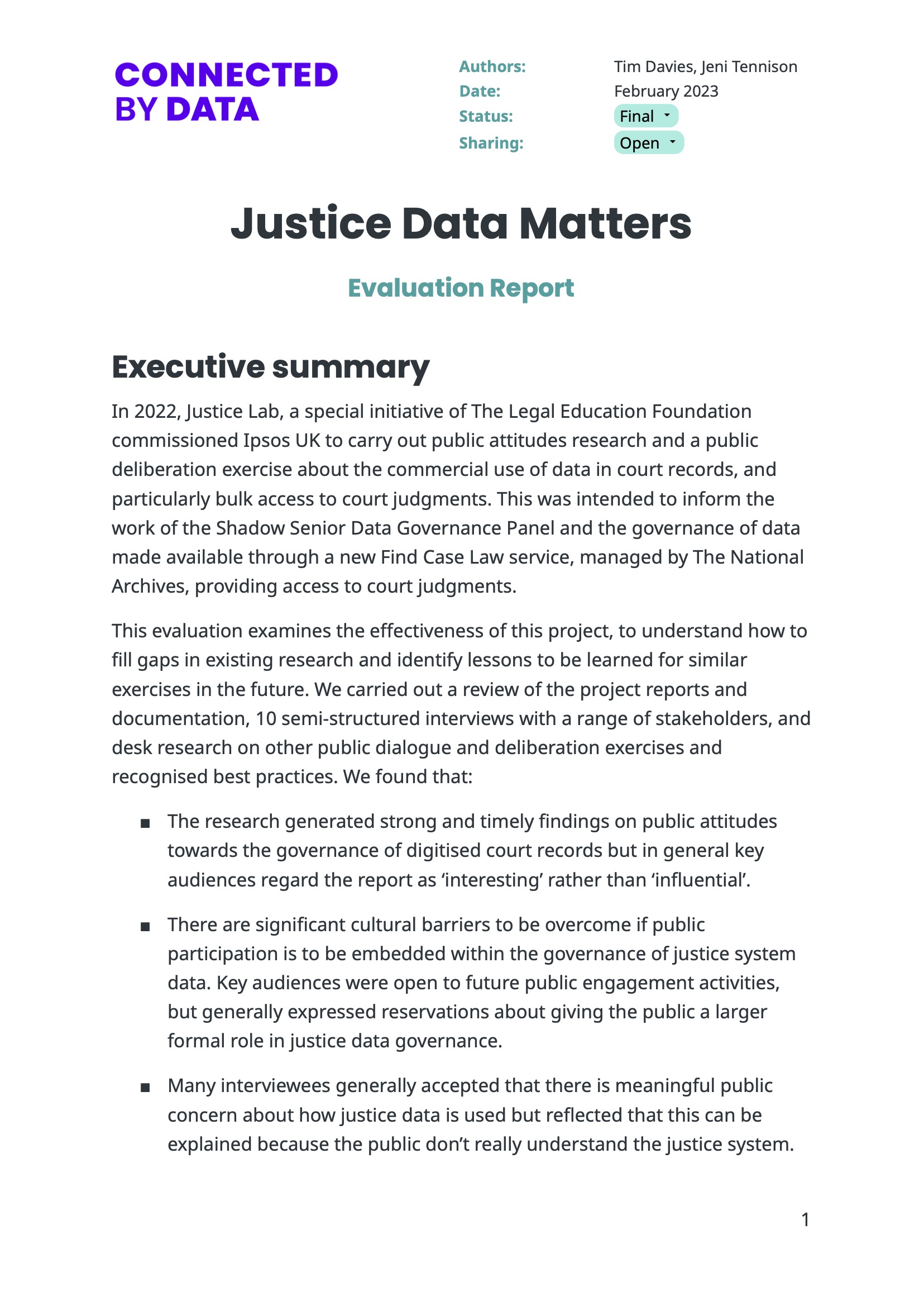In 2022, Justice Lab, a special initiative of The Legal Education Foundation commissioned Ipsos UK to carry out public attitudes research and a public deliberation exercise about the commercial use of data in court records, and particularly bulk access to court judgments. This was intended to inform the work of the Shadow Senior Data Governance Panel and the governance of data made available through a new Find Case Law service, managed by The National Archives, providing access to court judgments.
This evaluation examines the effectiveness of this project, to understand how to fill gaps in existing research and identify lessons to be learned for similar exercises in the future. We carried out a review of the project reports and documentation, 10 semi-structured interviews with a range of stakeholders, and desk research on other public dialogue and deliberation exercises and recognised best practices. We found that:
- The research generated strong and timely findings on public attitudes towards the governance of digitised court records but in general key audiences regard the report as ‘interesting’ rather than ‘influential’.
- There are significant cultural barriers to be overcome if public participation is to be embedded within the governance of justice system data. Key audiences were open to future public engagement activities, but generally expressed reservations about giving the public a larger formal role in justice data governance.
- Many interviewees generally accepted that there is meaningful public concern about how justice data is used but reflected that this can be explained because the public don’t really understand the justice system. Some perceived the concerns as addressing future challenges rather than current issues.
- The process adopted a well-planned and credible methodology, run by experienced facilitators, with a reasonable scope given the available timeline and resources. However, limited buy-in and engagement from decision makers, a lack of off-the-shelf explainers and other background materials, and limited time and resources for communicating about the public deliberation and its findings have restricted the overall impact of the process.
We have made five recommendations for Justice Lab to consider in future work:
- Build receptiveness of the justice system to public involvement in data governance by emphasising the risks of not securing a strong public mandate for court data sharing, or by situating public deliberation in comparison to other ways of engaging the public.
- Run more participatory exercises. There are several potential areas on which these could focus:
- exploring principles and practices of open justice in a digital age through a citizen’s assembly that explores the implications of records being public online instead of, as has historically been the case, only for those who physically go to access them
- examining the implications of future technologies on justice data using participatory futures methods that involve a systematically engage a diverse group of people in thinking through the consequences of a range of emerging technology scenarios
- informing the design of specific digital and data services such as the Find Case Law service through targeted consultation, participatory design, and participatory impact assessments around selected aspects of the service
- making decisions about data access requests through mini-publics (small groups selected to be broadly representative of the general population or affected communities) to articulate general principles for dealing with requests and through direct involvement of members of the public in making or reviewing decisions about specific requests
We recommend advocating for the first three but focusing direct energy and funding primarily on the fourth.
- Incorporate a communications and influencing strategy in future activities so the outcomes from deliberation more effectively impact on intended audiences.
- Develop robust background materials that explain key concepts of open justice and the use of data in the justice system to support future public engagement, and to reassure target audiences of the public’s understanding of complex justice issues and concepts.
- Create a cohort of participants from future mini-public activities who can opt-in to ongoing engagement with justice data governance.
Public participation in decisions related to the collection, access, and use of data is not yet standard practice. Initiatives like the Justice Data Matters research are leading the way both in developing approaches to bringing public voice into data governance and in helping those exercises inform official decision making.

